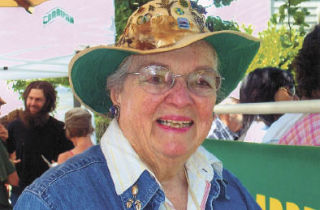Thomas Jefferson wrote, “There is not a sprig of grass that shoots uninteresting to me.”
This same sentiment is held by Master Gardener Emily Reid of Orcas Island. Born and raised on a wheat ranch in Washtucna, Washington in Adams County, she describes herself as, “… still a farmer. We were completely self sufficient except for sugar and tobacco. I’m still self sufficient. I’ve been gardening for more than 85 years. I’m probably the best trained gardener and have the best gardening library of anyone in the islands who call themselves gardeners.”
As a Biology major at Whitman College in Walla Walla, Emily went on marine biological study trips to Orcas Island. Her class would study tide pool life and bring back specimens in Formaldehyde, salt water, and alcohol for further examination. She ultimately graduated with degrees in botany and agriculture.
Emily taught the first Master Gardening classes ever organized in Oregon. For many years, her family split their time between Orcas, Eastern Washington, and Oregon. In 1953, Emily moved to Orcas Island with her husband and children, “… because we liked it. We were tired of living in the old, dry, dusty country. We could live wherever we wanted in the world and we chose Orcas. It was very hard work. But we loved it.”
“We bought a little, old, abandoned pasture and orchard. We liked it a lot and worked hard for 55 years. It was less expensive to have visitors come and camp here. It’s convenient to the water if you want to go fishing and not far from the hunting. The cabins on the property were originally built for gentleman hunters and fishermen. I had the impression then that they were more likely to be hunting than fishing. Anybody can catch a fish.”
Emily raised her family to live in harmony with the land; so hunting and fishing were part of their daily existence. “We take care of the land and extract our due. My father was a hunter and fisherman and it was wonderful to have fresh rabbit or fish on the table.“
When it comes to gardening, Emily says she tries to grow everything. She is currently experimenting with Salsify, Oyster Plant (Tragopogon porrifolius). “It’s grown for its root and makes a great stew, soup, or baked vegetable.” She still has pear trees, some over 100 years old. “Originally, there were around 500 pear trees. This year I don’t have as much fruit because the bees didn’t survive. Something is happening to our bee population. I’m not exactly sure what.”
When asked what changes she has observed on Orcas over the past 55 years Emily says, “The roads are black now instead of white. How’s that for a change? They used to be all white limestone. You could drive on them at night without your headlights.”
Emily also says that people are more sensitive to and considerate of the environment now. “People take better care of the plants and trees now and have better septic systems. People used to throw their garbage onto their neighbor’s property. About half a mile down the road, I spent four years hauling out garbage. By then what was left was the permanent stuff; pieces of metal and logging equipment that was thrown over the bank and into the creek. You’ve got to haul that out.
“My property has been inhabited since 1884. I’ve found bits of broken crockery, dishes, saw blades, glass insulators, and small tools that someone put down and forgot to pick up.”
In 85 years of gardening – the last 55 on Orcas – Emily Reid has not run out of projects or enthusiasm. She exemplifies what Margery Fish wrote in We Made A Garden (1956), “I could go on and on. But that is just what gardening is, going on and on.”
If you would like to suggest someone for Spotlight on Seniors please e-mail carmstrong@islandsweekly.net.




